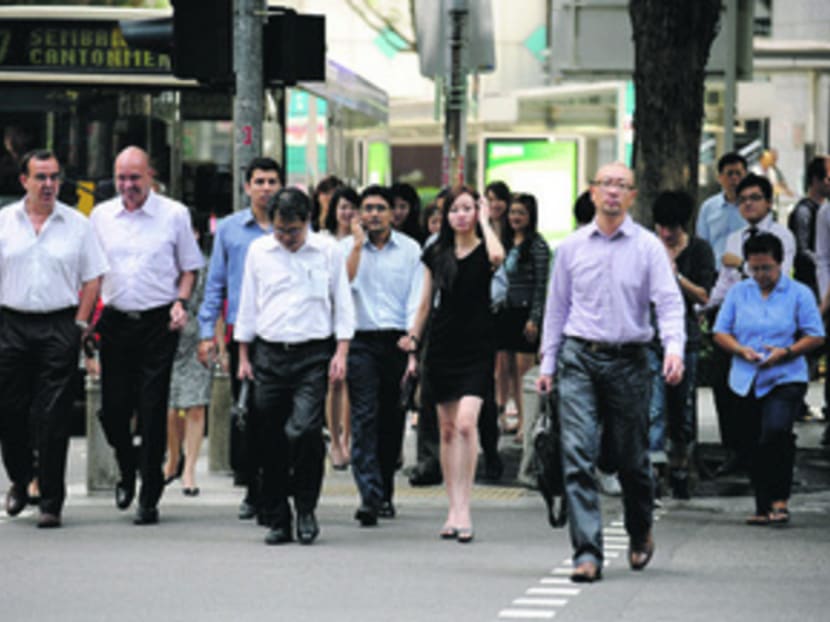Sparks fly during debate on foreign labour
SINGAPORE — After a brief hiatus, the People’s Action Party (PAP) and the Workers’ Party (WP) resumed verbal jousting over the latter’s alternative proposal to cap the number of foreign workers at current levels until 2020.
SINGAPORE — After a brief hiatus, the People’s Action Party (PAP) and the Workers’ Party (WP) resumed verbal jousting over the latter’s alternative proposal to cap the number of foreign workers at current levels until 2020.
The debate between the PAP and the WP got heated at times — with PAP Member of Parliament Lim Wee Kiak apologising for his “insensitive” comments in asking WP chief Low Thia Khiang to turn up his hearing aid — as Mr Low defended the Opposition party’s proposal and its position on foreign workers, under heavy scrutiny by PAP MPs including Minister in the Prime Minister’s Office S Iswaran and Acting Manpower Minister Tan Chuan-Jin.
Describing the WP’s proposal as “drastic and inherently very risky”, Mr Iswaran said it would have a “chilling effect” on the Republic’s economy.
He said: “The Workers’ Party is taking an extreme risk on the livelihoods of Singaporeans and the survival of our businesses. In contrast, the Government is advocating a measured and balanced approach to bring about the transformation of our economy.”
He stressed that should the Government turn off the foreign-worker tap — as the WP suggests — it cannot simply turn it on again.
“Such a precipitous move will also send the completely wrong signal to the business and investor community, be it local or international. It will be breaking faith with companies who are already invested here and are in the process of ramping up their operations,” he said.
“It will damage our reputation and severely impair our efforts to attract new and different businesses which can precisely offer diverse job opportunities that better-educated Singaporeans seek.”
In response, Mr Low said the Government should “stand firm” against pressures from multinational corporations (MNCs).
Noting that big businesses have always had “a big appetite for cheap foreign labour”, to the detriment of Singaporean workers whose wages could be depressed, Mr Low said the WP does not want to “rock the economy” and has taken a “very careful, considered (and) calibrated approach”.
Mr Low said: “I recall ... during the early days of independence, there was a company that came to Singapore to invest and wanted to put their tank, their diesel tank or whatever tank, on Singapore soil and threatened that if it could not, then it would withdraw. (Then-Deputy Prime Minister) Dr Goh Keng Swee said, ‘Stand firm on that’. I think we need the PAP leaders to stand firm to the MNCs and say, ‘Look this is our way and we think we should do that for the betterment of Singapore’.”
Mr Iswaran replied: “Why are we being more cautious this time? Because you’re not talking about one diesel tank. You’re talking about millions of jobs and hundreds of thousands of companies. I think it warrants caution and a certain level of measure in the way we do things.”
He added that the WP’s “extreme” proposal to freeze the number of foreign workers here will send the wrong signals and “potentially cause irreparable damage to our reputation and our ability to then turn on the tap (after 2020) as the Workers’ Party thinks we can.”
In his speech, Mr Low charged that the Government is “kicking the can down the road” with its White Paper, which the WP has rejected.
Mr Low said: “The solutions must be sought by focusing on promoting the quality of life of Singaporean families. By focusing on immigration, the Government is using the cause of the problems today as the solution for tomorrow.”
Dissecting the WP’s proposal, Mr Tan called it “attractive” and “an exciting narrative that trades off growth for a smaller population to focus on a quality for life for Singaporeans”. But if put in practice, it would hurt Singaporeans, he said.
Mr Tan also said he was “slightly confused” by what he considered a change in Mr Low’s stance. He recalled that Mr Low had said in Parliament during last year’s Budget debate, that the tightening of foreign labour would result in a higher cost of living and that the supply of these workers were crucial to the survival of small and medium enterprises.
“It’s a bit difficult to reconcile ... but clearly and quite definitively, I think this seems to be the final position the Worker’s Party is taking but it is a very alarming one,” said Mr Tan.
In response, Mr Low said Mr Tan had taken his comments made during last year’s Budget debate “out of context” and he did not see “any contradiction”. He said: “I have said many times in this House that we need to control the foreign worker inflow ... I have also said that foreign workers have depressed Singaporeans’ wages and taken away Singaporeans’ jobs.”
Mr Low also took a jibe at Mr Tan’s probing for more details on how the WP would seek to raise labour force participation rate.
“If he thinks his ministry cannot do much and want the Workers’ Party to do more, perhaps he wants to put his ministry’s resources under the Workers’ Party,” said Mr Low.
During his speech, Mr Tan, while noting that Singapore’s labour force participation rate is one of the highest in the world, said: “But I think we can do more. The various measures that we have put in place, we will continue to work on it.”
He added: “But raising the labour force participation rate has limits. This is because we know that the labour force participation rates for the older workers ... tends to be lower than the younger segments of the workforce. As our workforce is becoming older and with a low total fertility rate, our overall labour force participation rate will decrease over time despite improvements across age groups.”










